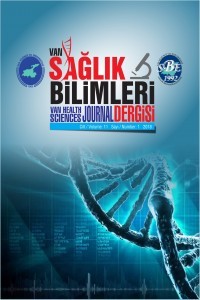OMUZ İMPİNGEMENT SENDROMU ve ROTATOR CUFF CERRAHİSİNDE ORTA DÖN EM SON UÇLARI
Omuz ağrıları yaygın bir sorun olarak karşımıza çıkmaktadır. Omuz ağrılarının en çok nedeni rotatör manşet patolojileri ve subakromial sıkış ma sendromudur. Bu çalış manın amacı akro miyoplasti ile beraber yapılan rotator manşet yırtıklarının açık cerrahi sonuçlarını ve tedavi deneyimlerinin literatür eşliğinde paylaşılmasıdır. Hastanemiz Ortopedi ve Travmatoloji polikliniğine başvuran rotatör manşet yırtığı ve subakromia l sıkış ma sendromu nedeniyle ameliyat edilen 20 hasta çalış maya alındı. Hastaların yaşı, c insiyeti, MR (Magnetic Rezonans) bulguları, ameliyat öncesi ve sonrası fizik muayene bulguları, ameliyat sırasında elde edilen veriler ve etkilenen tendonlar kaydedildi. Omuz eklem hareket açıklığı dereceleri ve fonksiyonel sonuçları ameliyat öncesi ve ameliyat sonrası altıncı aydaki değerleri kaydedildi. Fonksiyonel sonuçlar için Constant-Murrey omuz skorla ma sistemi kullanıldı. Hastaların yaş ortalaması 56,4 yaş, 11’i (% 55) kadın, 9’u (% 45) erkek hasta idi. Hastalarımızdaki rotator manşet patolojilerinin 18’i (% 90) dejeneratif kaynaklı iken 2 hastamızda (% 10) ise travmatik kaynaklı idi. MR (Magnetik Rezonans) bulgularına gore 8 hastamızda Tip 3 Akromion, 12 hastamız da ise Tip 4 Akromion mevcuttu. Genel anestezi altında cerrahi yaptığımız hasta sayısı 12(%60), interskalen blok anestezi altında opere ettiğimiz hasta sayısı 8 (%40) olarak kaydedildi. Omuz rotatör manşet ve subakromial sıkış ma sendromunda, akromioplasti ile beraber rotator cuff tamirinin de yapılmasının daha etkili ve daha iyi fonksiyonel sonuçlar elde edileceği kanaatine varıld ı.
Anahtar Kelimeler:
Omuz, Rotator manset, Akromioplasti
MID-TERM RES ULTS of SHOULDER IMPINGEMENT SYNDROME and ROTATOR CUFF SURGERY
Shoulder pain is a common problem. The most common cause of shoulder pain is rotator cuff pathologies and subacromial impingement syndrome. The aim of this study was to present our open surgical results of rotator cuff tears with acromioplasty. Twenty patients who underwent surgery for rotator cuff tears and subacromial impingement syndrome were included in the study. Patients' age, gender, MRI findings, physical examination findings before and after surgery, and tendons affected during surgery were recorded. Shoulder range of motion and functional results were evaluated preoperatively and postoperatively at the 6th month. Constant-Murrey shoulder scoring system was used for functional results. The mean age of our patients was 56,4 years, 11 (55%) were female and 9 (45%) were male. While 18 (90%) of the rotator cuff pathologies in our patients were degenerative, 2 of our patients (10%) were traumatic. According to MR (Magnetic Resonance) findings, 8 patients had Type 3 Acromion and 12 patients had Type 4 Acromion. The number of patients underwent surgery with general anesthesia was 12 (60%) and the number of patients operated under interscalene block anesthesia was 8 (40%). It was concluded that rotator cuff repair with acromioplasty would be more effective and better functional results in the shoulder rotator cuff and subacromial impingement syndrome.
Keywords:
Shoulder, Rotator cuff, Acromioplasty,
___
- Adamson GJ, Tibone JE. Ten-year assessment of primary rotator cuff repairs. J Shoulder Elbow Surg. 1993; 2:57-65.
- Baltacı G, Beşler A, Bayrakçıtunay V. Omuz sıkışma sendromunun konservatif tedavisinde manipulatif yöntemlerin etkisi. Clin. Res. 2002;13(1): 27-33
- Bang MD, Deyle GD. Comparison of Supervised Exercise With and Without M Manuel Physical Therapy for Patients With Shoulder İmpingement Syndrome. J Orthopaedic. Spor Phys Ther. 2000; 30(3):126-137.
- Bigliani LU, Cordasco F, Mcllveen SJ, Musso E.Operativ e repair of massive rotator cuff tears: long term results. J Shoulder Elbow Surg. 1992;1: 120- 130. Cofield RH. Rotator cuff disease of the shoulder. J Bone Joint Surg 1985; 67: 974-979.
- Conroy DE, Hayes KW. The Effect of Joint Mobilization as a Component of Compr expensive Treatment for Primary Shoulder İmpingement Syndrome.JOSPT 1998; 28:3- 13.
- Constant CR, Murley AH. A clinical method of functional assessment of the shoulder. Clin Orthop. 1987;214: 160-4.
- Demirhan M, Akman Þ, Kılıçoğlu Ö, Yılmaz A. Subakromiyal sıkışma sendromları ve cerrahi tedavis i. Acta Orthop Traumatol Turc 1996; 30: 11- 17. Ellman H, Garts man GM. Open Repair of Full-Thickness Rotator Cuff Tears. Philadelphia, Baltimore: 1993: 181- 202.
- Fu FH, Harner CD, Klein AH. Shoulder impingement syndrome. Clin Orthop. 1991; 269:162-173.
- Getz CL, Buzzell JE, Krishnan SG. Shoulder Instability and Rotator Cuff Tears. Flynn JM, editor. Orthopedic Knowledge Update 10. Rosemont: Americ an Academy of Orthopaedic Surgeons. 2011;299–315.
- Knebl JA, Shores JH, Gamber RG. Improving functional arability in the elderly via the Spencer technique, an osteopathic manipulative treatment. JAOA. 2002; 102(7):387-396.
- Matsen FA, Arntz CT, Lippitt SB. Rotator cuff. In: Rockwood CA, Matsen FA eds. The shoulder. Vol. 2, 2nded. Philadelphia, WB. Saunders. 1998:755-839.
- Motycka T, Kriegleder B, Landsiedl F. Results of open repair of the rotator cuff - a long term review of 79 shoulders. Arch Orthop Trauma Surg 2001; 121: 148-151.
- Neer CS, Marberry TA. On the disadvantages of radical acromion nectomy. J Bone Joint Sur g 1981;63:41- 69.
- Romeo A, Hang D, Bach B, Short S. Repair of full thickness rotator cuff tears. Clin Orthop Related Res. 1999; 367: 243- 255.
- Sarıs alt ık H, Akıncı O, Gürbüz H. Subakromiyal sıkış ma sendromunun evrelendirilmesinde kullanıl an tanıs al yönteml erin karşılaştırılmas ı. Acta Orthop Traumatol Turc. 2000; 34: 475-479.
- Windt DA, Koes BW, Boeke AJ, Devillé W, De Jong BA, Bouter LM. Shoulder disorders in general practice: prognostic indicators of outcome. Br J Gen Pr act. 1996;46(410): 519- 23.
- Yishay AB, Zuckerman JD, Gallagher M. Pain inhibit ion of shoulder strength in patients with impingement syndrome. Orthopedics. 1994;17: 685- 688.
- ISSN: 2667-5072
- Başlangıç: 2018
- Yayıncı: Van Yüzüncü Yıl Üniversitesi
Sayıdaki Diğer Makaleler
VAN İLİ ÖZALP İLÇESİNDE ÇOCUKLARDA Pediculus humanus capitis’in YAYGINLIĞI
RESVERATRO L ve COQ10’in FOTON ZAYIFLATMA KARAKTERİSTİKLERİ
OMUZ İMPİNGEMENT SENDROMU ve ROTATOR CUFF CERRAHİSİNDE ORTA DÖN EM SON UÇLARI
Ali Rıza KUL, Veysel BENEK, Sema KAPTANOĞLU, Salih ALKAN, Vedat AVCI
GLİOBLASTOMA’da 5-FU ve CELASTROL’ün SİTOTOKSİK ETKİSİ
Mehmet TAŞPINAR, Farika Nur DENİZLER, Mustafa GÜVEN, Veysel YÜKSEK, Sedat ÇETİN, Semiha DEDE
OMUZ ÇIKIĞINDA GÜVENİLİR ETKİN VE BASİT BİR YÖNTEM: SPASO TEKNİĞİ
